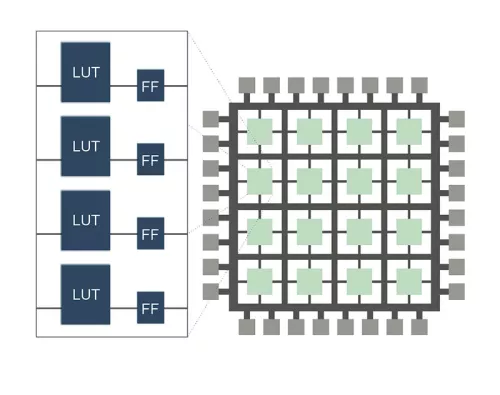Silicon-verified, production-proven eFPGA for MCU/SoC/custom ASIC applications - optimized for edge and endpoint AI processing, military and automotive.
QuickLogic has been supplying eFPGA-based products for consumer, industrial and mission-critical applications for nearly three decades. Our eFPGA IP enables SoC designers the flexibility to easily program custom functions, hardware accelerators and security capability after an SoC has been manufactured.
eFPGA IP and FPGA Software Built on GLOBALFOUNDRIES 22FDX
Overview
Key Features
- High-performance architecture for low power applications
- Super Logic Cell (SLC) clusters 4 logic cells together with hierarchical routing networks for optimum performance and power consumption
- Each logic cell can be used as two separate 4-input LUTs or one 5-input LUT.
- Direct input selection to the register allows combinatorial and sequential logic to be used separately.
- Multiple outputs per logic cell are strategically selected to either feedback within the same SLC or to travel out to another SLC. A shared register clock, set, and reset signals for all four logic cells helps reduce routing congestion.
- Array sizes ranging from 8×8 SLC up to 64×64 SLCs
Benefits
- Expand addressable market of your SoC through on-chip reprogrammability
- Market test new features and functions before committing to hard gates or custom silicon
- Protect your ASIC by using the eFPGA as a reprogrammable isolation area for security or authentication IP
- Extends product longevity and hardware-based Continuous Integration (CI)
Block Diagram

Technical Specifications
Foundry, Node
GLOBALFOUNDRIES 22FDX
GLOBALFOUNDRIES
Pre-Silicon:
22nm
FDX
Related IPs
- eFPGA IP and FPGA Software Built on Samsung Foundry 28nm FDSOI
- 65nm/40nm Low Power eFPGA IP and Open Source FPGA Software
- NIST P-256/P-384 ECDH+ECDSA - Compact ECC IP Cores supporting ECDH and ECDSA on NIST P-256/P-384
- MIPI C-PHY-D-PHY Combo PHY IP on TSMC 28nm HPC+
- SATA 3 HOST IP on ARRIA 10 FPGA
- High-performance and low-power 2D vector graphics IP core